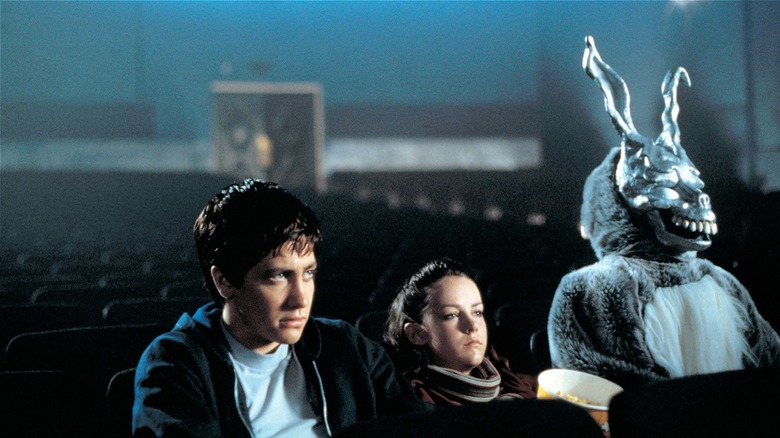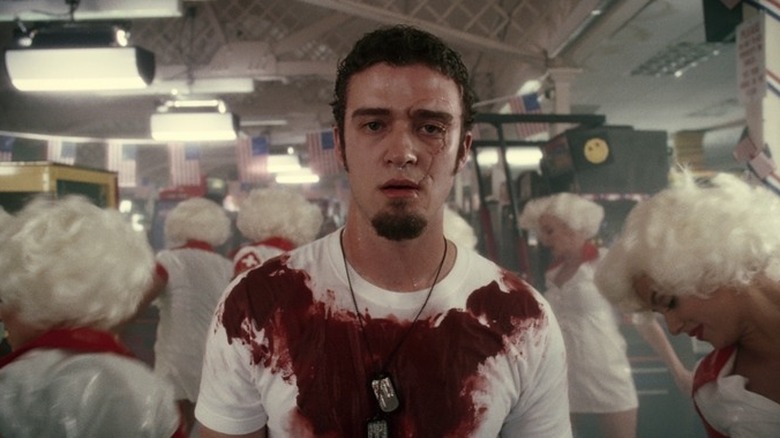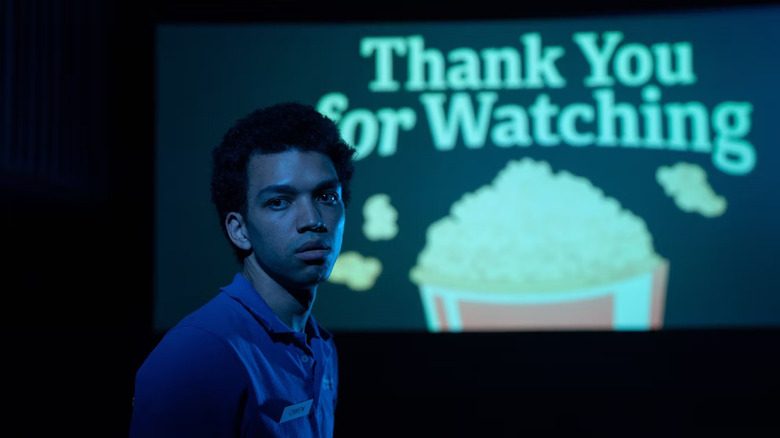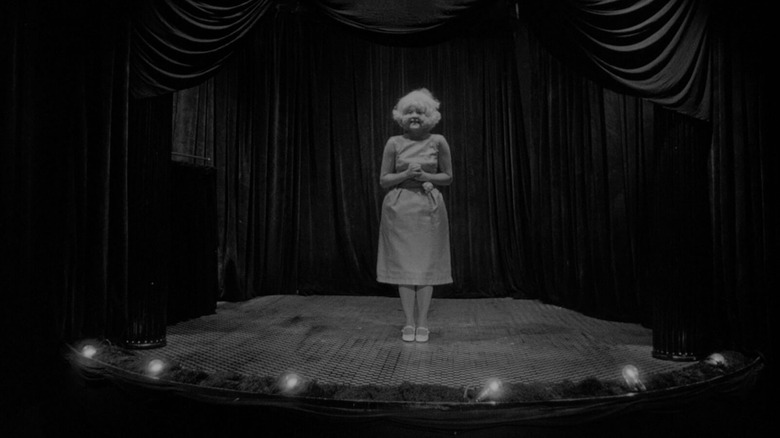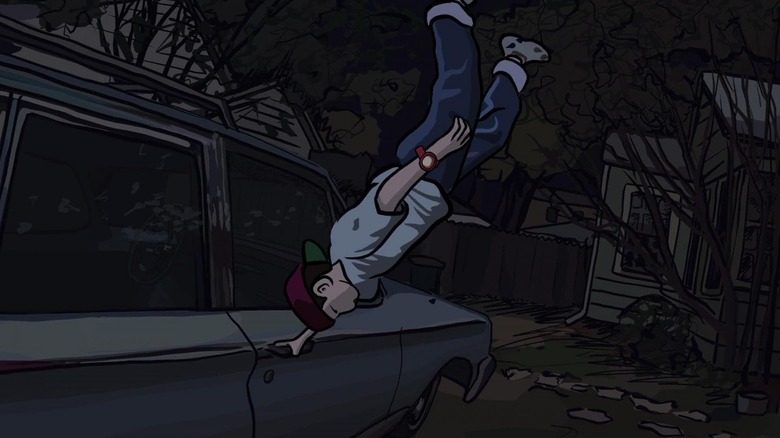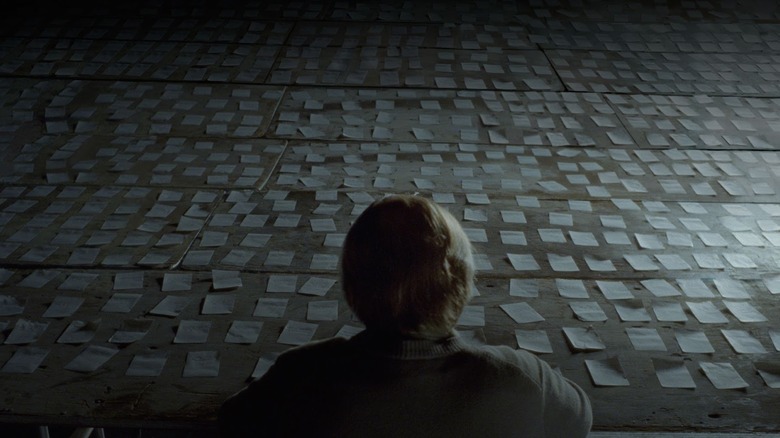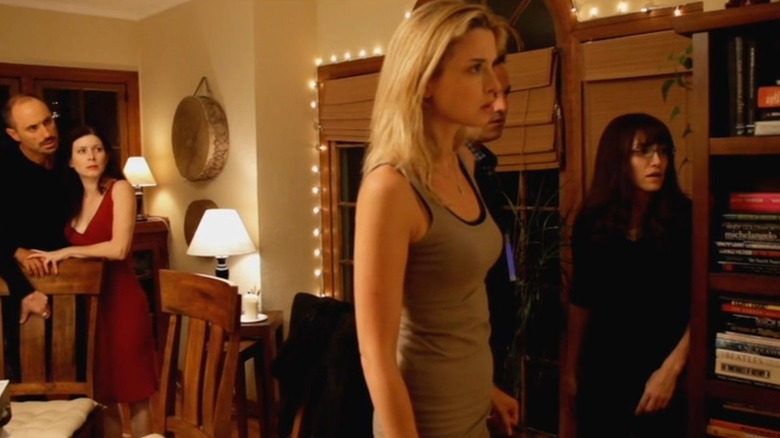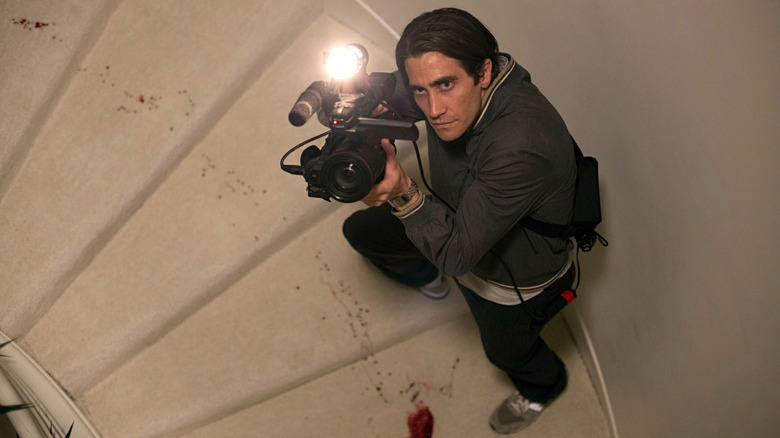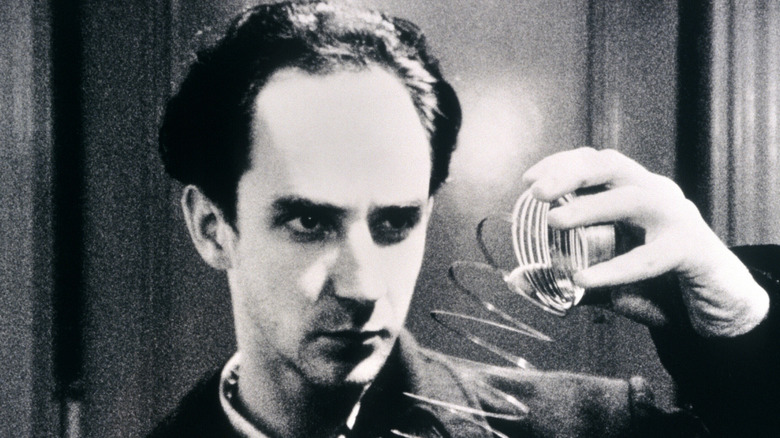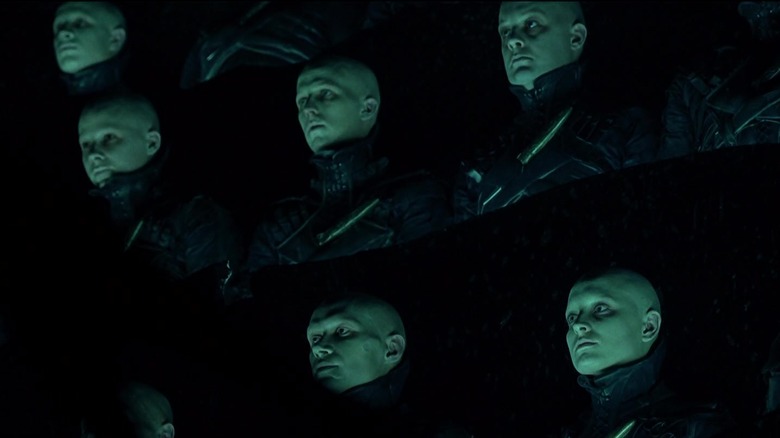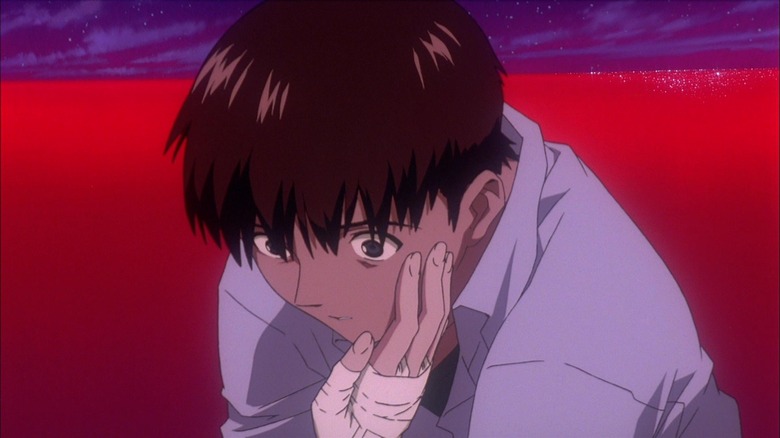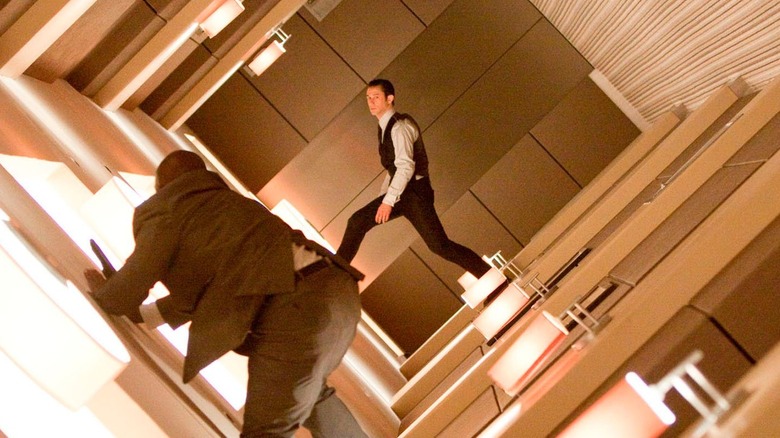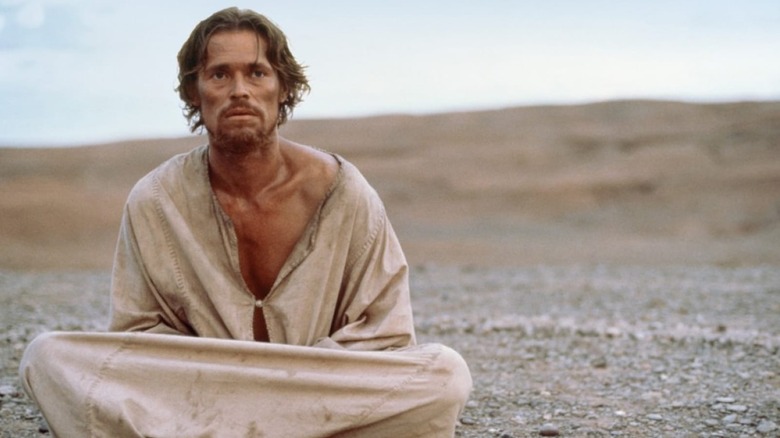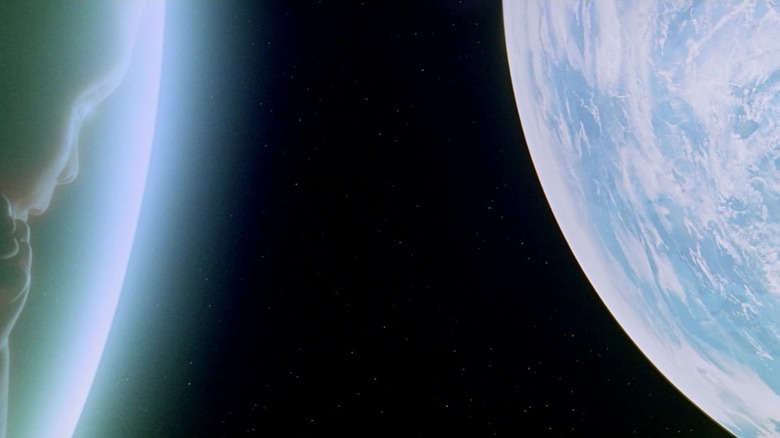13 Best Movies Like Donnie Darko
"Donnie Darko" — a sci-fi thriller about a troubled teenager (Jake Gyllenhaal) receiving warnings of the oncoming apocalypse from a guy in a rabbit suit (James Duval) — went from a box office bomb to one of the biggest cult classics of the 21st century. As with many cult favorites, Richard Kelly's 2001 film developed its fandom in part because it was so utterly unique. There's not any other movie out there that's exactly like "Donnie Darko."
For those looking for comparable cinematic experiences, however, there are a good number of films made from similarly unique perspectives that possess some of the same qualities that made "Donnie Darko" so captivating. Whether through mind-bending mysteries, adolescent angst, unnerving atmosphere, or some or all of the above, the following 13 movies evoke some aspect of "Donnie Darko" and come highly recommended for that film's fans. Not coincidentally, five of these films are, like "Donnie Darko," directorial feature debuts — the works of artists desperate to fit as much of their soul into one movie, not knowing if they'll get the chance to direct another.
(Note that the "Donnie Darko" direct-to-video sequel "S. Darko" — a sequel you probably had no idea existed — is not on this list, because it is bad and everyone who knows about it wants to forget its existence.)
Southland Tales
Richard Kelly has only directed two films since "Donnie Darko": 2006's "Southland Tales" and 2009's "The Box." Both of these follow-ups flopped with critics and audiences in initial release, but as ambitious passion projects are wont to do, "Southland Tales" has picked up some passionate defenders in the ensuing years. Whether you end up loving or hating it, it's worth watching for its wild ambition and vision.
Summarizing the plot — involving World War III, warps in spacetime, Neo-Marxist revolutionaries, the Book of Revelation, and a cheesy screenplay by amnesiac actor Boxer Santaros (Dwayne Johnson) and adult film star Krysta Now (Sarah Michelle Gellar) overtaking reality — would take all day. It's a mess (and technically "Chapters 4-6" of a bigger multimedia epic, with Chapters 1-3 released as comics), but a fascinating one.
With its ensemble of B-list celebs and "Saturday Night Live" stars, direct attacks on the Bush administration, and musical centerpiece in which Justin Timberlake trips out while lip-syncing to The Killers' "All These Things That I've Done," "Southland Tales" has aged into a spot-on time capsule of the 2000s. By exaggerating the problems of the time, "Southland Tales" predicted the future that the intersection of politics and trash culture was heading toward. Parts of the film are brilliant, while others are intentionally stupid, but holding it together is that the cast is in on the joke. Remember back when Dwayne Johnson actually acted?
I Saw the TV Glow
Jane Schoenbrun has cited Richard Kelly as one of their major inspirations as a director, and their 2024 film "I Saw the TV Glow" gets as close to the atmosphere of "Donnie Darko" as any movie in recent memory. Where "Donnie Darko" looked at suburban alienation in the 1980s, "I Saw the TV Glow" addresses similar themes in a '90s setting, taking a critical look at nostalgia for the era's pop culture to frame a story about discovering (and denying) identity.
High school students Owen (Justice Smith) and Maddy (Jack Haven) bond over the "Buffy the Vampire Slayer"-esque young adult show "The Pink Opaque." Escaping an abusive home, Maddy runs away at the same time "The Pink Opaque" gets canceled, only to reunite with Owen years later to offer a grave warning about their perceived reality. Packed with metaphors, "I Saw the TV Glow" keeps the audience asking questions throughout — and for LGBTQ+ viewers especially, the answers it provides will rip your heart out of your chest. It was one of the best movies of 2024.
Eraserhead
This article was written shortly after the death of David Lynch, so it feels more relevant than ever to acknowledge the debt that "Donnie Darko" owes to the great American surrealist auteur. Consider this a recommendation for pretty much his whole filmography, but we've decided to spotlight "Eraserhead," the feature debut that announced Lynch's unique talents to the world in 1977 and became a staple of the midnight movie circuit.
A word of advice for "Donnie Darko" fans experiencing "Eraserhead" for the first time: while the weird parts of "Darko" play like a mystery to be solved (with the director's cut arguably explaining too much), Lynch's weirdness is meant to be felt rather than rationally explained. "Eraserhead," with its bleeding chicken dinners, radiator concerts, exploding planets, and screeching monster of a baby, can be interpreted many ways, perhaps making most sense as a horror film about parenthood. But don't go looking for any official explanations. When Lynch was asked in a BAFTA interview if he would elaborate on why he called "Eraserhead" his "most spiritual film," the director responded, "No."
Waking Life
Premiering at the 2001 Sundance Film Festival alongside "Donnie Darko," Richard Linklater's "Waking Life" is about an unnamed man (played by Wiley Wiggins) trapped within a lucid dream. The loose narrative follows his journey to wake up and find a path to reality through philosophical conversations with an assortment of colorful figures. These conversations are interesting enough on their own, but what really makes the film special are its vibrant surreal visuals created via a digital form of rotoscoping, the technique wherein animators paint over live-action footage.
"Waking Life" presents a wide variety of perspectives on the meaning of life and the nature of reality. You won't agree with all of the film's speakers (jump scare warning: a not-yet-infamous Alex Jones appears in one scene), but the questions it asks make for a thought-provoking, mind-altering experience. It's the sort of film that stretches your concept of what a film can be. Linklater would later return to rotoscope animation with the paranoid Philip K. Dick adaptation "A Scanner Darkly" (another good pick for "Donnie Darko" fans) and the semi-autobiographical 1960s nostalgia piece "Apollo 10 1/2: A Space Age Childhood."
Synecdoche, New York
If you're looking for weird movies that sit on the border between funny and upsetting, digging through the works of Charlie Kaufman might be your next obsession. Kaufman made his name writing the screenplays for such high-concept mind-benders as "Becoming John Malkovich" and "Adaptation" for director Spike Jonze and "Eternal Sunshine of the Spotless Mind" for Michel Gondry. 2008's "Synecdoche, New York" was the first time Kaufman directed his own script, and the results were, well, extremely Kaufman-esque.
Leaning much more on the upsetting than the comedic, "Synecdoche, New York" stars Philip Seymour Hofman as Caden Cotard, an obsessive-compulsive theatre director whose life is not just falling apart, but also being strenuously recreated in a decades-long hyper-realistic play. And the play is also being recreated inside the play, while the world is ending outside. Needless to say, it gets complicated. Some critics found it pretentious, but Roger Ebert considered it the best film of the 2000s. If you can get on its wavelength, its reflections of life and death are hard to shake.
Coherence
The concept of time travel as presented in "Donnie Darko" operates around the idea of duplicate "Tangent Universes." The 2013 indie film "Coherence," written and directed by James Ward Byrkit, takes this concept of the multiverse to even more complicated extremes. Before the Marvel Cinematic Universe and "Everything Everywhere All at Once" turned multiverse stories into a mainstream trend, Byrkit's film pulled off its magic trick on a shoestring budget of $50,000 (for contrast, the still fairly low-budget "Donnie Darko" cost somewhere between $4.5 million and $6 million).
How the story plays out is best discovered watching it for yourself. To set it up, there's a group of friends having a dinner party when a comet passes overhead and — even this feels like saying too much. All you need to know is that this is a very creative piece of science fiction, tightly plotted yet also featuring an appealingly loose style, with fun, improvisatory performances from a cast that includes "Buffy the Vampire Slayer" actor Nicholas Brandon and "Succession" director Lorene Scafaria. Up-and-coming filmmakers can find a lot of inspiration here in how to do a lot with very little.
Nightcrawler
If your love of "Donnie Darko" stems in any large part from Jake Gyllenhaal's creepy breakout performance, you owe it to yourself to see just how creepy Gyllenhaal can act by watching "Nightcrawler." Dan Gilroy's 2014 thriller stars Gyllenhaal as Louis "Lou" Bloom, a man of zero morals who finds an unorthodox career path as a "nightcrawler" ambulance chaser selling video footage of disasters, accidents, and crime scenes to local news stations.
Lou's willingness to do anything to get the most thrilling footage, actively putting others in danger to make a name for himself while dodging any consequences for his crimes, makes for intensely stressful viewing and serves as a damning reflection on the state of television journalism in America. Like the car crashes he films, Lou is repulsive but, thanks to Gyllenhaal's acting talent, you can't look away from him. Gyllenhaal's performance got nominated for just about every major award except an Oscar ("Nightcrawler" managed only one Academy Award nomination, for Gilroy's screenplay).
Pi
From the addicts of "Requiem for a Dream" to the ballerinas of "Black Swan," the films of Darren Aronofsky are driven by characters seeking transcendence and finding self-destruction. The blueprint for all of Aronofsky's future tragedies is right there in his 1998 debut "Pi," a low-budget black-and-white thriller about a mentally ill mathematician (Sean Gullette) who seeks out the secrets of God and the universe through numbers — and does not like what he finds.
Back in the early 2000s, Aronofsky almost directed a script written by Richard Kelly, based on the Kurt Vonnegut novel "Cat's Cradle." Even with Leonardo DiCaprio attached as a producer, this adaptation never got off the ground, likely because, as Kelly told Uncut, "it's a difficult novel to adapt." Like their tragic heroes, "Pi" and "Donnie Darko" tread a fine line between genius and madness, and while the "Cat's Cradle" movie might have fallen too far into the later, it's easy to see why Kelly and Aronofsky would be drawn to collaborate with one another.
Dark City
Like "Donnie Darko," Alex Proyas' 1998 sci-fi noir "Dark City" has set off lots of debates over whether the theatrical cut or director's cut is better. For "Donnie Darko," the theatrical version is more mysterious, while the director's edition explains more. For "Dark City," it's the opposite: the theatrical cut opens with exposition telling the audience the premise, while the director's cut makes the viewer slowly figure out what's happening alongside amnesiac protagonist John Murdoch (Rufus Sewell).
Whichever version you watch, "Dark City" is a wild ride, drawing heavy inspiration from German expressionism and film noir for its stunning visuals and twisting narrative. Shot in Australia around the same time as "The Matrix" and even sharing some of the same crew, "Dark City" didn't find the same breakout success as that other turn-of-the-millennium reality-questioning sci-fi film, but, like most films on this list, has found a dedicated cult following in the decades since its release.
The End of Evangelion
This one requires a bit of homework: "The End of Evangelion" is a sequel/alternate ending to the TV anime "Neon Genesis Evangelion," so you'll need to watch the original show first for it to make any sense (here's the correct order in which to watch "Neon Genesis Evangelion"). But this homework is worth it: not only is "Evangelion" one of the best anime shows of all time, but the finale movie arguably surpasses "Donnie Darko" as cinema's greatest teen angst apocalypse.
While Donnie ultimately chooses to prevent the end of the world at the cost of his own life, would-be world savior Shinji Ikari finds himself pushed to such extremes of loneliness and misanthropy in "The End of Evangelion" that he actively lets the apocalyptic Third Impact happen around him — and has to live with the consequences. Anyone who's written analysis of the religious and Jungian symbolism in "Donnie Darko" will have a field day with "The End of Evangelion" and its lavish, terrifying spectacle of symbolic imagery and heavy psychodrama. The visions conjured up by the film's animators will haunt your nightmares for years to come.
Inception
Unlike everything else on this list up to this point, Christopher Nolan's "Inception" can't really be called a cult film — it's a big-budget blockbuster that made $839 million worldwide and is almost universally acclaimed. And yet for all its acceptance by the mainstream, "Inception" has played a similar role to "Donnie Darko" in broadening the taste of budding cinephiles, preparing them to handle more intellectually challenging material than what Hollywood typically churns out.
The Nolan-"Darko" connection goes deeper than you might expect. Hot off the success of "Memento" (also recommended for "Darko" fans, though it lacks the sci-fi elements of "Inception"), Nolan and his wife-producer Emma Thomas convinced Newmarket Films to take a chance on releasing "Donnie Darko" and offered an editing suggestion to Richard Kelly to clarify the film's countdown to doomsday. That suggestion was a perfect representation of what makes Nolan's films work so well: for all the ways they screw with time and, in the case of "Inception," multiple layers of dreams and reality, they give the audience just enough guidance that they're able to follow along for the ride.
The Last Temptation of Christ
On his Halloween date with Gretchen (Jena Malone), Donnie goes to a movie theater showing an unconventional double feature of "The Evil Dead" and "The Last Temptation of Christ." The reference to Martin Scorsese's controversial 1988 biblical epic isn't just there for laughs. While very different films in genre and style, the stories of "Donnie Darko" and "The Last Temptation of Christ" have much more in common than they would appear to possess on the surface.
There are many narrative parallels one can dig into, but the biggest ones are that both Donnie and Jesus (Willem Dafoe) are supposed to die for the sake of the world. Both are tempted by an alternate existence in which they don't make their sacrifice, before ultimately accepting their messianic responsibilities. In "Donnie Darko," this alternate world is the Tangent Universe most of the film takes place in; in "The Last Temptation of Christ," it's a vision created by Satan (Leo Marks) that Jesus experiences while on the cross.
2001: A Space Odyssey
We now conclude this list of recommendations with one of the unimpeachable classics of cinema history. "2001: A Space Odyssey" and "Donnie Darko" might not seem like an obvious comparison; the two have less in common in terms of plot or themes than "Darko" and any of the other movies listed. However, without the influence and success of "2001," "Darko" and all of the other films on this list might not even exist.
"2001" is one of Richard Kelly's top five favorite films of all time. Speaking to Rotten Tomatoes, Kelly said of Stanley Kubrick's 1968 head-trip, "It pioneered everything, and it's a film that says pretty much everything that needs to be said about our species ... I don't know if anyone has broken ground quite in the way that Kubrick did with that film."
Opening at the dawn of human evolution and ending with a voyage "beyond the infinite" that kickstarts a new phase of that evolution — with a sharp warning about the potential dangers of A.I. in the middle — "2001" laid the groundwork for every arthouse science fiction film since, especially ones that relish ambiguity and leaving things open for debate. If you've ever watched a movie and actually needed the ending explained for you, thank "2001: A Space Odyssey."
